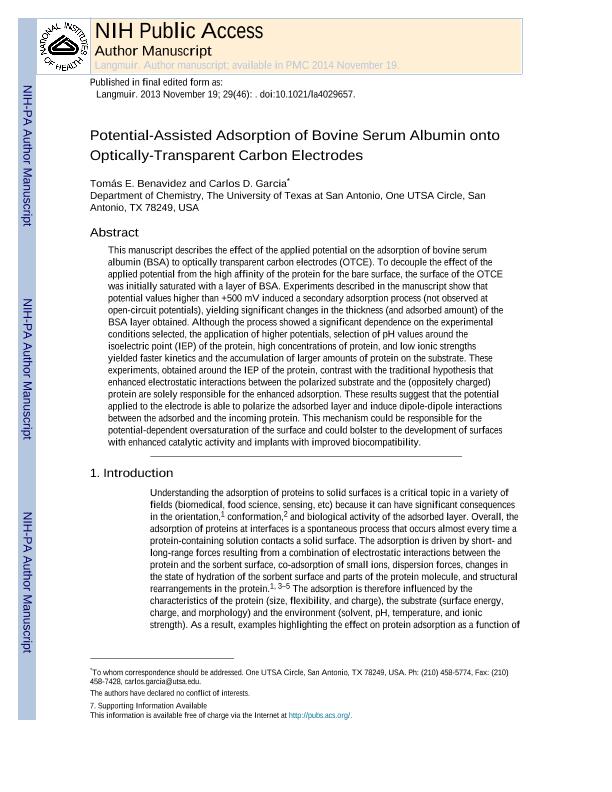Mostrar el registro sencillo del ítem
dc.contributor.author
Benavidez, Tomás Enrique

dc.contributor.author
Garcia, Carlos D

dc.date.available
2018-08-07T18:12:20Z
dc.date.issued
2013-11
dc.identifier.citation
Benavidez, Tomás Enrique; Garcia, Carlos D; Potential-assisted adsorption of bovine serum albumin onto optically transparent carbon electrodes; American Chemical Society; Langmuir; 29; 46; 11-2013; 14154-14162
dc.identifier.issn
0743-7463
dc.identifier.uri
http://hdl.handle.net/11336/54451
dc.description.abstract
This article describes the effect of the applied potential on the adsorption of bovine serum albumin (BSA) to optically transparent carbon electrodes (OTCE). To decouple the effect of the applied potential from the high affinity of the protein for the bare surface, the surface of the OTCE was initially saturated with a layer of BSA. Experiments described in the article show that potential values higher than +500 mV induced a secondary adsorption process (not observed at open-circuit potential), yielding significant changes in the thickness (and adsorbed amount) of the BSA layer obtained. Although the process showed a significant dependence on the experimental conditions selected, the application of higher potentials, selection of pH values around the isoelectric point (IEP) of the protein, high concentrations of protein, and low ionic strengths yielded faster kinetics and the accumulation of larger amounts of protein on the substrate. These experiments, obtained around the IEP of the protein, contrast with the traditional hypothesis that enhanced electrostatic interactions between the polarized substrate and the (oppositely charged) protein are solely responsible for the enhanced adsorption. These results suggest that the potential applied to the electrode is able to polarize the adsorbed layer and induce dipole-dipole interactions between the adsorbed and the incoming protein. This mechanism could be responsible for the potential-dependent oversaturation of the surface and could bolster to the development of surfaces with enhanced catalytic activity and implants with improved biocompatibility.
dc.format
application/pdf
dc.language.iso
eng
dc.publisher
American Chemical Society

dc.rights
info:eu-repo/semantics/openAccess
dc.rights.uri
https://creativecommons.org/licenses/by-nc-nd/2.5/ar/
dc.subject
Optically Transparent Carbon Electrodes
dc.subject
Protein Adsorption
dc.subject
Bovine Serum Albumin
dc.subject.classification
Otras Ciencias Químicas

dc.subject.classification
Ciencias Químicas

dc.subject.classification
CIENCIAS NATURALES Y EXACTAS

dc.title
Potential-assisted adsorption of bovine serum albumin onto optically transparent carbon electrodes
dc.type
info:eu-repo/semantics/article
dc.type
info:ar-repo/semantics/artículo
dc.type
info:eu-repo/semantics/publishedVersion
dc.date.updated
2018-07-30T15:24:04Z
dc.identifier.eissn
1520-5827
dc.journal.volume
29
dc.journal.number
46
dc.journal.pagination
14154-14162
dc.journal.pais
Estados Unidos

dc.journal.ciudad
Washington DC
dc.description.fil
Fil: Benavidez, Tomás Enrique. Consejo Nacional de Investigaciones Científicas y Técnicas. Centro Científico Tecnológico Conicet - Córdoba. Instituto de Investigaciones en Físico-química de Córdoba. Universidad Nacional de Córdoba. Facultad de Ciencias Químicas. Instituto de Investigaciones en Físico-química de Córdoba; Argentina. University of Texas; Estados Unidos
dc.description.fil
Fil: Garcia, Carlos D. Consejo Nacional de Investigaciones Científicas y Técnicas. Centro Científico Tecnológico Conicet - Córdoba. Instituto de Investigaciones en Físico-química de Córdoba. Universidad Nacional de Córdoba. Facultad de Ciencias Químicas. Instituto de Investigaciones en Físico-química de Córdoba; Argentina. University of Texas; Estados Unidos
dc.journal.title
Langmuir

dc.relation.alternativeid
info:eu-repo/semantics/altIdentifier/url/https://www.ncbi.nlm.nih.gov/pmc/articles/PMC3867293/
dc.relation.alternativeid
info:eu-repo/semantics/altIdentifier/doi/http://dx.doi.org/10.1021/la4029657
dc.relation.alternativeid
info:eu-repo/semantics/altIdentifier/url/https://www.sciencedirect.com/science/article/pii/S0003267014012860
Archivos asociados
